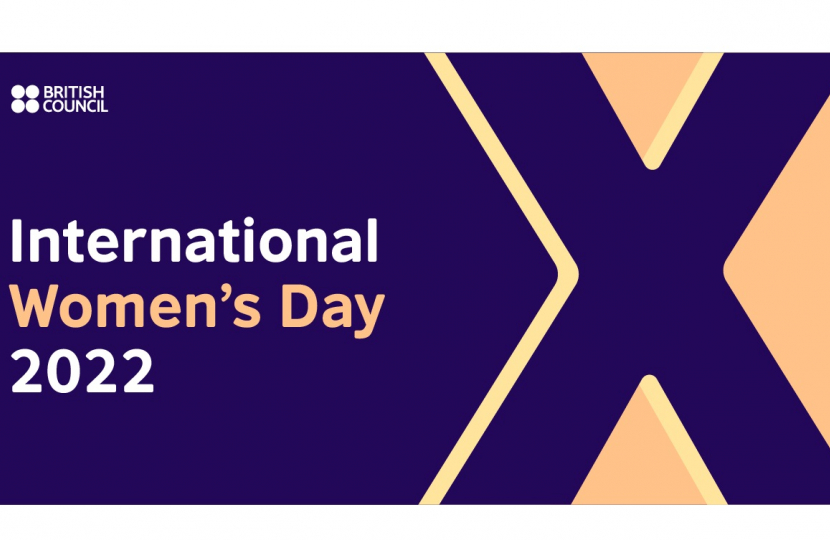
Theo Clarke MP for Stafford was a panellist at the British Council’s Education Exchange event for International Women’s Day. As a Global Partnership for Education champion for Girls’ Education, Ms Clarke gave a speech about the importance of girls around the world receiving 12 years quality education. Ms Clarke welcomes that the Government has announced £515 million of funding to help get over 12 million more children into school. During her speech, Ms Clarke thanked the British Council for the work they do across the world to improve access to education.
Theo Clarke MP for Stafford’s speech:
I am delighted to speaking to you all about girls’ education, today, on International Women’s Day. It is widely recognised that giving a child a good education is the foundation of them having a successful future. Not only does a quality education improve the life of the individual, but it also benefits the society in which they live. This is why I support the British Council’s efforts to improve global education and today’s event to help “Break The Bias” this International Women’s Day.
To me, providing girls with 12 years quality education is key to improving the lives of millions of women across the world. When girls are educated, there are more jobs for everyone. If all girls went to school for 12 years, low and middle income countries could add 92 billion dollars per year to their economies. A staggering figure.
Educated girls are also less likely to marry young and more likely to have healthy, educated children - with each additional year of school a girl completes cutting both infant mortality and child marriage rates. Communities are also more stable and can recover faster after conflict when girls are educated, with extremism growing hand in hand with inequality.
This is why I welcome the important steps that the UK Government has taken to support education both in the United Kingdom and throughout the world. In his first speech as Prime Minister, The Rt Hon Boris Johnson MP, committed to ensuring that all girls receive 12 years of quality education. This is something that I fully agree with. The Prime Minister has also announced £515 million to help get over 12 million children into school, this will boost economic growth and improve women’s rights in some of the poorest countries in the world.
I am sure that you, like I, have been horrified by the Russian Invasion of Ukraine and the devastating pictures of children fleeing their homes. This war has not only turned these children’s lives upside down, but it has also removed them from their schools, their place of stability and learning too.
I am honoured to be part of United Kingdom’s delegation to the Council of Europe. From discussions with our European partners on the Migration Committee, it is clear to me that we must continue to work together to tackle the issues that cause people to become displaced. It is important we remember that when children sadly have to leave their homes, time does not stop, they continue to grow up. Therefore, in order to ensure that these children succeed as adults in the future, we must make sure that wherever they are in the world and whatever their circumstances, they continue to be educated.
Never has this been clearer to me than, when I visited the Malala school in Lebanon. Malala herself is a leading example of how education can transform people’s lives. She famously said “They cannot stop me. I will get my education, if it is in the home, school, or anyplace.” And she did. This is why I was honoured to visit the Malala school in Lebanon and see the wonderful work they are doing to provide displaced children with an education. On my visit I saw first-hand how UK Aid is being used to educate displaced Syrian girls. Efforts at schools such as this and the education programmes that the British Council supports, help to ensure that a generation of girls are not being lost and hopefully, thanks to education they are receiving, in the future they will become teachers and doctors in Syria.
As the co-chair of the All Party Parliamentary Group for the United Nations’ Sustainable Development Goals, I understand how the SDGs provide a path to a better future.
SDG 4 aims to “ensure inclusive and equitable quality education and promote lifelong learning opportunities for all.” We have made progress over the last 25 years in this area. In fact, since the 1995 Beijing Declaration and Platform for Action, was adopted at the UN’s Fourth Conference on Women, more than 130 million children have gained access to school. And 60% of those children were girls. This is good progress, but I believe more can be done.
We also know that to effectively govern the population, parliaments need to be representative of their population, drawing upon the widest possible pools of talent and experience. Yet currently men are still dominating the corridors of power around the world. As a member of the Women and Equalities select committee, this is a matter I care deeply and about. In the UK, men currently outnumber women 2:1 in parliament with only 32% of MPs being female, listing us number 39 in the world below many countries across the world including many of our European neighbours. When visiting the Rwandan Parliament, I was impressed to hear that 64% of MPs are female. Despite their harrowing history, this country is leading the way in female political representation. Partially due to the unique opportunity presented to women following the genocide in which many men were imprisoned or killed and partially due to political leadership at the very top, who called for equal opportunities for all in Rwanda and brought in progressive legislation, such as land rights for women. If Rwanda can do this, then so can we.
As the Prime Minister’s Trade Envoy to Kenya, I was delighted to attend the UK Kenyan Co-Hosted Girls’ Education Summit last Summer. I welcome that a record $4 billion was raised from donors for Girls’ Education. The United Kingdom’s pledge of $600 million for Girls’ Education at this Summit, is the UK’s largest ever pledge to Global Partnership for Education. The United Kingdom also remains the Global Partnership for Education’s top bilateral donor, helping to get over 80 million more children attending school by 2025.
I welcome the progress that has been made on Girls’ Education and I want to thank the British Council, and everyone on this call, for the work you do across the world, to improve access to education. I pledge to continue to champion Girls’ Education and I hope that in our role as Global Britain we will be able to ensure that the United Nations’ Sustainable Development Goal of a quality education for all, is achieved.
